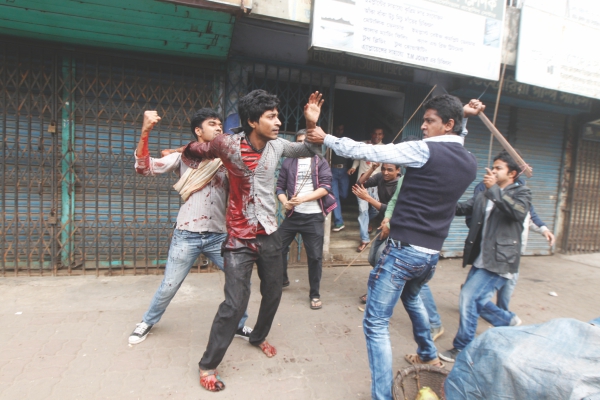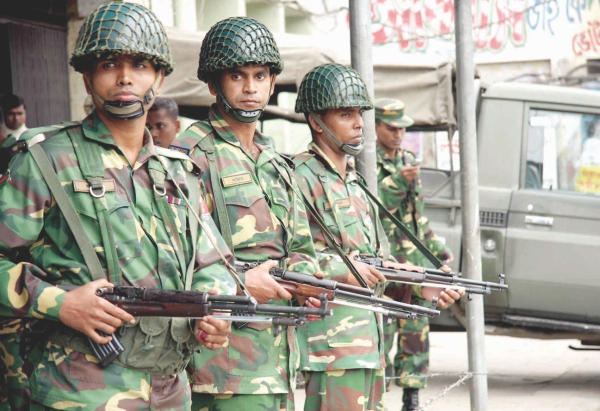| Home - Back Issues - The Team - Contact Us |
 |
| Volume 11 |Issue 51| December 28, 2012 | |
|
|
Periscope
Deus Ex Machina AHMEDE HUSSAIN 2013, the election year, is going to be crucial for the country, as crucial perhaps as 2007. In fact, a parallel can be drawn between the two, for the nation and its politics are where they had been six years ago. The events ruining up to the declaration of the State of emergency in 2007 are eerily similar to the country's existing political situation. The "omega point" was October 28, 2006 when members of Awami League (AL) and Jamaat-e-Islami (JI), armed to the teeth, were locked into a seven-hour-long street battle in downtown Dhaka, leaving two dead on both sides. The crisis was scripted well–the Election Commission was bent on holding the polls with a flawed voters list, and the ruling Bangladesh Nationalist Party (BNP)-led alliance was pulling all the strings available to make Justice KM Hassan, a political appointee, the Chief of the Caretaker Government (CG). Violence in the street, coupled with both the major parties arrogance and an insatiable hunger for power, gave birth to a political impasse that led to the declaration of the State of Emergency, a deus ex machina, an extra power or event that solves the unsolvable.
Many may argue that the ongoing political crisis is even worse than what they had witnessed in the winter of 2006. The provision for the CG to foresee the election has been abolished two years ago, and chances are high that an election held under a party government albeit in the guise of an interim one will not be acceptable to the BNP, let alone the ordinary citizens. One of the few saving graces that the AL has had–the war crimes trial–has come under increasing international scrutiny, and overzealous actions of some AL leaders have given the ordinary citizens the impression that the trial is merely a political issue, that the AL wants to pursue for political mileage. The JI might resort to violent street agitations in the days to come, and the government's highhanded behaviour towards the BNP might push the party further towards the JI, which is going to benefit the latter. The JI wants to use the BNP and the restoration of the CG as a shield to carry out its own agenda–to foil the war crimes trial. The JI is politically safe as long as the AL and BNP remain at loggerheads, for it will give the party the opportunity to be in the street calling for the release of its leaders who are facing the war crimes trial along with the popular demand for the restoration of the CG. The JI will thrive as long as the CG issue remains unresolved, otherwise it will have to walk the future alone. Be it enforcing a strike or blocking the streets to materialise its demands, the BNP, on the other hand, is heavily dependent on the JI. When it comes to demanding the release of the JI leaders, the party has so far kept its junior partner at an arm's length, never raising its voice against the idea of having a war crimes trial. The party's best bet is to force the government into accepting the CG, as it believes that if the polls are held under a neutral CG, it will win majority seats to form government. The party's contingency plan perhaps is violent street agitation should the government want to hold the election without the participation of the major opposition parties.
Besides some stray comments made by some of its Ministers, the AL has so far been consistent in its refusal to hold the election under an unelected government. From what some of its leaders have said it can be deduced that the party is open to the idea of an interim government where members of all the political parties that have seats in the Parliament can have a presence. The AL, however, might call for proportional representation with Sheikh Hasina remaining the Prime Minister. Novel though the idea is, it might not be acceptable to the main opposition. An election held without the participation of both the major political parties will not be internationally acceptable. It will also make the AL hugely unpopular among the masses, and in that scenario, the more the AL will try to politically use the war crimes trial, the more tenuous war crimes will be as an issue in the election. The solution lies in forging a national consensus on all the major issues of the day. A deus ex machina is perhaps a national unity government comprising of representatives from all the major political parties and civil society groups to oversee the next general election. 2013 is going to be an interesting year, as interesting perhaps as Bangladesh’s recent political history has been.
Copyright
(R) thedailystar.net 2012 |

